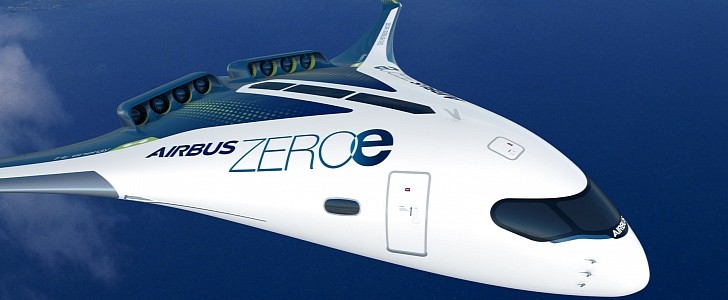A couple of years have passed since a group of Chief Technology Officers (CTOs) of some of the biggest names in the aerospace industries has launched a joint commitment to support sustainable aviation. The seven CTOs are now reaffirming that commitment, showcasing what they have achieved so far, and what are the next goals.
The CTOs of Airbus, Boeing, Dassault Aviation, GE Aviation, Pratt & Whitney, Rolls-Royce, and Safran, recently came together in London, at an industry event held by ADS, an organization that represents the aerospace industry (among other industries) in the UK.
The main focus areas for the future development of sustainable aviation, according to the joint statement that was issued, are engine and aircraft innovative technology development, on one hand, and Sustainable Aviation Fuel (SAF) and hydrogen research, on the other hand.
Both Airbus and Boeing have reaffirmed their readiness to have their entire commercial fleets run on 100% SAF by 2030, while Dassault Aviation's Falcon range is already SAF-compatible. Boeing has partnered with SAF specialist SkyNRG, has launched a joint venture with Kitty Hawk, to advance electric air taxis, and is testing multiple innovative technologies on its ecoDemonstrator program. Airbus is also approaching sustainability from different angles and supporting SAF while also working on hydrogen-powered aircraft.
Rolls-Royce intends to demonstrate, by 2023, that all of its Trent engines are compatible with 100% SAF. It has also signed an agreement with Shell, for advancing SAF production and it’s collaborating with several companies that are developing all-electric aircraft.
Also related to engines, GE Aviation and Safran have launched the CFM RISE (Revolutionary Innovation for Sustainable Engines) program, earlier this year. These innovative engines could enable 20% lower fuel consumption, compared to current advanced engines, and the program also focuses on their compatibility with SAF and hydrogen. On the other hand, Safran is also working with Airbus, to test hydrogen technologies at their joint venture (ArianeGroup)’s facilities.
Last but not least, Pratt & Whitney announced a partnership with Collins Aerospace and the Canadian government, to develop a hybrid-electric flight demonstrator. Plus, its new facility in Carlsbad, California, is developing engine technologies.
The seven CTOs also launched a call to action, which invites government representatives, fuel producers, and airport operators to support these efforts, by investing in SAF, hydrogen research and a new infrastructure.
The main focus areas for the future development of sustainable aviation, according to the joint statement that was issued, are engine and aircraft innovative technology development, on one hand, and Sustainable Aviation Fuel (SAF) and hydrogen research, on the other hand.
Both Airbus and Boeing have reaffirmed their readiness to have their entire commercial fleets run on 100% SAF by 2030, while Dassault Aviation's Falcon range is already SAF-compatible. Boeing has partnered with SAF specialist SkyNRG, has launched a joint venture with Kitty Hawk, to advance electric air taxis, and is testing multiple innovative technologies on its ecoDemonstrator program. Airbus is also approaching sustainability from different angles and supporting SAF while also working on hydrogen-powered aircraft.
Rolls-Royce intends to demonstrate, by 2023, that all of its Trent engines are compatible with 100% SAF. It has also signed an agreement with Shell, for advancing SAF production and it’s collaborating with several companies that are developing all-electric aircraft.
Also related to engines, GE Aviation and Safran have launched the CFM RISE (Revolutionary Innovation for Sustainable Engines) program, earlier this year. These innovative engines could enable 20% lower fuel consumption, compared to current advanced engines, and the program also focuses on their compatibility with SAF and hydrogen. On the other hand, Safran is also working with Airbus, to test hydrogen technologies at their joint venture (ArianeGroup)’s facilities.
Last but not least, Pratt & Whitney announced a partnership with Collins Aerospace and the Canadian government, to develop a hybrid-electric flight demonstrator. Plus, its new facility in Carlsbad, California, is developing engine technologies.
The seven CTOs also launched a call to action, which invites government representatives, fuel producers, and airport operators to support these efforts, by investing in SAF, hydrogen research and a new infrastructure.







